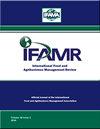了解印度尼西亚小农奶农不采用技术的情况
IF 1.5
4区 经济学
Q3 AGRICULTURAL ECONOMICS & POLICY
International Food and Agribusiness Management Review
Pub Date : 2024-03-13
DOI:10.22434/ifamr2022.0045
引用次数: 0
摘要
农民合作社是一种纵向协调战略,旨在降低交易成本,促进农民采用技术。合作社的作用是对各项活动进行内部协调,其中可能包括执行措施、提供优质投入、内部控制以及与买方谈判有利的交易条件。然而,人们对合作社在内部活动协调方面的表现如何促进或阻碍合作社成员继续采用农业技术的了解却很有限。我们对印度尼西亚西爪哇的奶制品行业进行了案例研究,并采用了混合方法,结合了奶制品合作社董事会成员和奶牛养殖户的见解。我们的研究结果表明,不采用奶业技术的根源在于确保投入和产出质量的监督和执行机制薄弱或不存在、缺乏价格激励以及推广服务不足。此外,缺乏严密的监督和控制机制也削弱了合作社与投入品提供商和牛奶买家讨价还价的能力。除非合作社内部的这些问题得到解决,否则小农将无法继续采用推荐的奶牛养殖方法。本文章由计算机程序翻译,如有差异,请以英文原文为准。
Understanding dis-adoption of technologies by smallholder dairy farmers in Indonesia
Farmer cooperatives represent a vertical coordination strategy aimed at reducing transaction costs and facilitating the adoption of technologies among farmers. In their roles, cooperatives undertake internal coordination of activities which may include enforcement measures, provision of quality inputs, internal control, and negotiation of favourable terms of exchange with buyers. However, limited attention has been given to understanding how cooperatives’ performance in the internal coordination of activities either promotes or hinders the continued adoption of agricultural technologies among cooperative members. We conducted a case study of the dairy sector in West Java, Indonesia, and utilised a mixed-method approach combining insight from dairy cooperative board members and dairy farming households. Our results suggest that the dis-adoption of dairy technologies is rooted in weak or non-existent monitoring and enforcement mechanisms to ensure input and output quality, the absence of price incentives, and inadequate provision of extension services. Furthermore, the lack of tight monitoring and control mechanisms reduces the cooperatives’ bargaining power with input providers and milk buyers. Unless these issues within the cooperatives are addressed, continued adoption of recommended dairy farming practices by smallholder farmers will not be sustained.
求助全文
通过发布文献求助,成功后即可免费获取论文全文。
去求助
来源期刊

International Food and Agribusiness Management Review
AGRICULTURAL ECONOMICS & POLICY-
CiteScore
2.90
自引率
0.00%
发文量
0
审稿时长
>12 weeks
期刊介绍:
The IFAMR is an internationally recognized catalyst for discussion and inquiry on issues related to the global food and agribusiness system. The journal provides an intellectual meeting place for industry executives, managers, scholars and practitioners interested in the effective management of agribusiness firms and organizations.
IFAMR publishes high quality, peer reviewed, scholarly articles on topics related to the practice of management in the food and agribusiness industry. The Journal provides managers, researchers and teachers a forum where they can publish and acquire research results, new ideas, applications of new knowledge, and discussions of issues important to the worldwide food and agribusiness system. The Review is published electronically on this website.
The core values of the Review are as follows: excellent academic contributions; fast, thorough, and detailed peer reviews; building human capital through the development of good writing skills in scholars and students; broad international representation among authors, editors, and reviewers; a showcase for IFAMA’s unique industry-scholar relationship, and a facilitator of international debate, networking, and research in agribusiness.
The Review welcomes scholarly articles on business, public policy, law and education pertaining to the global food system. Articles may be applied or theoretical, but must relevant to managers or management scholars studies, industry interviews, and book reviews are also welcome.
 求助内容:
求助内容: 应助结果提醒方式:
应助结果提醒方式:


